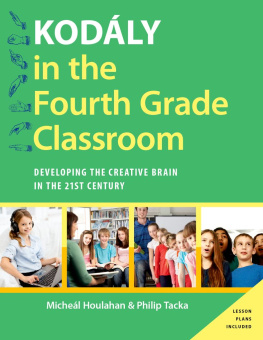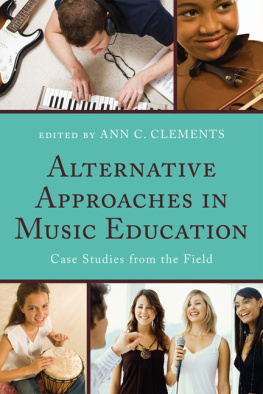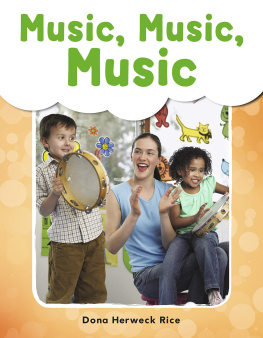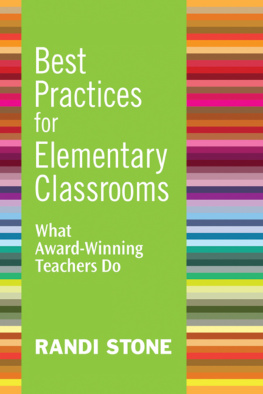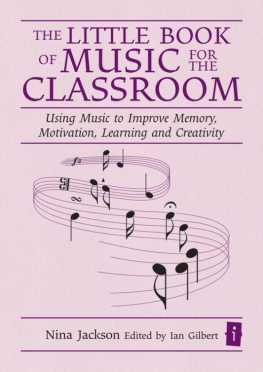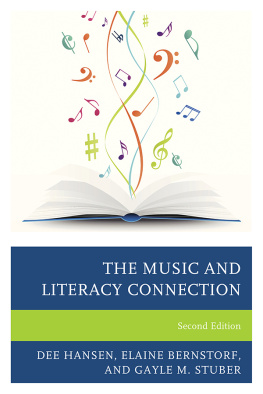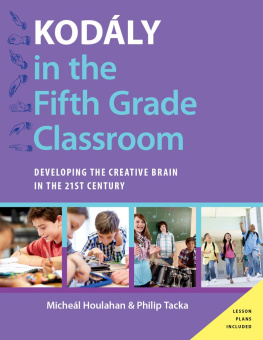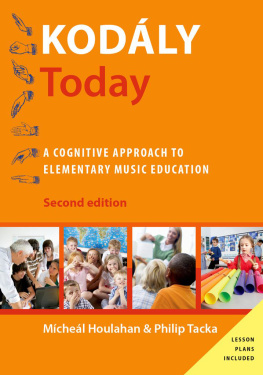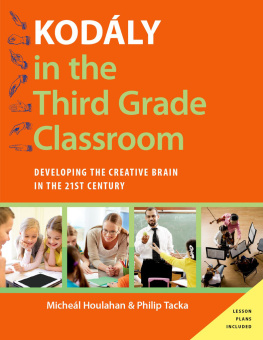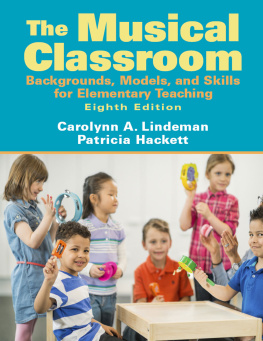Kodly in the Fourth Grade Classroom
Kodly Today Handbook Series
Michel Houlahan and Philip Tacka
Kodly Today: A Cognitive Approach to Elementary Music Education, second edition
Kodly in the Kindergarten Classroom: Developing the Creative Brain in the 21st Century
Kodly in the First Grade Classroom: Developing the Creative Brain in the 21st Century
Kodly in the Second Grade Classroom: Developing the Creative Brain in the 21st Century
Kodly in the Third Grade Classroom: Developing the Creative Brain in the 21st Century
Kodly in the Fourth Grade Classroom: Developing the Creative Brain in the 21st Century
Kodly in the Fifth Grade Classroom: Developing the Creative Brain in the 21st Century

Oxford University Press is a department of the University of Oxford. It furthers the Universitys objective of excellence in research, scholarship, and education by publishing worldwide.
OxfordNew York
AucklandCape TownDar es SalaamHong KongKarachi
Kuala LumpurMadridMelbourneMexico CityNairobi
New DelhiShanghaiTaipeiToronto
With offices in
ArgentinaAustriaBrazilChileCzech RepublicFranceGreece
GuatemalaHungaryItalyJapanPolandPortugalSingapore
South KoreaSwitzerlandThailandTurkeyUkraineVietnam
Oxford is a registered trademark of Oxford University Press in the UK and certain other countries.
Published in the United States of America by
Oxford University Press
198 Madison Avenue, New York, NY 10016
Oxford University Press 2015
All rights reserved. No part of this publication may be reproduced, stored in a retrieval system, or transmitted, in any form or by any means, without the prior permission in writing of Oxford University Press, or as expressly permitted by law, by license, or under terms agreed with the appropriate reproduction rights organization. Inquiries concerning reproduction outside the scope of the above should be sent to the Rights Department, Oxford University Press, at the address above.
You must not circulate this work in any other form and you must impose this same condition on any acquirer.
Library of Congress Cataloging-in-Publication Data
Houlahan, Michel.
Kodly in the fourth grade classroom / by Michel Houlahan and Philip Tacka.
pages cm. (Kodly today handbook series)
Includes bibliographical references and index.
ISBN 9780190235819 (alk. paper); 9780190248512 (hardback); eISBN 9780190273040
1.School musicInstruction and study.2.Kodly, Zoltn, 18821967.3.Fourth grade (Education)CurriculaUnited States.I.Tacka, Philip.II.Title.
MT1.H836 2015
372.87049dc23
2014033387
We are the music-makers,
And we are the dreamers of dreams,
Wandering by lone sea-breakers,
And sitting by desolate streams;
World-losers and world-forsakers,
On whom the pale moon gleams:
Yet we are the movers and shakers
Of the world for ever, it seems.
Ode, by Arthur OShaughnessy
[...] eratque tam turpe Musicam nescire quam litteras
from De Musica, by Isidoris Hispalensis
Legyen A Zene Mindenki [Music should belong to everyone]
Zoltn Kodly
Contents
We owe a debt of gratitude to the many individuals who inspired, encouraged and helped us along the way. Both of us were fortunate enough to study at the Franz Liszt Academy/Kodly Pedagogical Institute in Hungary and at the Kodly Center of America with world-renowned Kodly experts, many of whom were Kodlys pupils and colleagues, who shared their knowledge with us over many years. Among them were Erzsbet Hegyi, Ildik Herboly-Kocsr, Lilla Gbor, Katalin Komls, Katalin Forrai, Mihly Ittzs, Klra Kokas, Klra Nemes, Eva Vendrai, Helga Szab, Laszlo Esze, Peter Erdei, and Katalin Kiss. We are especially indebted to Katalin Forrai for her support and encouragement for the research contained in this publication. Our research is grounded in their many valuable insights and research.
Special thanks are due to these individuals for critically reading portions of the manuscript, field-testing lesson plans, and insightful suggestions regarding this approach to instruction and learning: Nick Holland, lower school music teacher at St. Pauls School in Baltimore, Maryland; Lauren Bain, elementary music specialist in the Northeast School District of San Antonio, Texas; Georgia Katsourides, music specialist in the Lancaster City School District, Pennsylvania; and Vivian Ferchill, retired music specialist from Round Rock, Texas.
Special acknowledgment must be made to Patty Moreno, director of the Kodly Certification Program at Texas State University, San Marcos, for her support and continued encouragement of this project. We would also like to thank Holly Kofod and Lisa Roebuck for their comments, which helped us bring this book to completion.
Many of our students in Kodly Certification Programs at Texas State University; Belmont University in Nashville, Tennessee; and the Eastman School of Music in Rochester, New York, have all helped us shape our approach to instruction and learning presented herein. Kristopher Brown, Jos Pelaez, Rebecca Morgan, Loren Tarnow, and Meredith Riggs deserve special mention. Gratitude is due Rebecca Seekatz for her work on the game directions and for her work on the accompanying glossary of terms. Our many years working together have not only contributed to the information we present but also served as a continuing source of inspiration in working with the pedagogical processes we have shaped.
Regarding practical matters, we would like to thank our students at Millersville University of Pennsylvania for helping us with initial drafts of the manuscript. Special thanks are due Jamie Duca for her technical and hands-on assistance.
This book would not be so complete in terms of pedagogy and educational content were it not for readings and comments from Blaithn Burns, Kodly instructor at the Blue Coat School. She provided invaluable assistance in the initial design of Kodly in the Fourth Grade Classroom and field-tested many teaching strategies. Richard Schellhas deserves thanks for his personal patience and understanding as well as words of encouragement and advice throughout the writing of this manuscript.
Research for this publication was supported by a grant from Millersville University, the State System for Higher Education in Pennsylvania. The universitys library assistance, technical, administrative, and financial support, and overall encouragement for this project allowed us to bring this volume to completion. We would like to express our gratitude to Gabriella Montoya-Stier and Faith Knowles for their permission to include songs from their collections El Patio de Mi Casa: 42 Traditional Rhymes, Chants, and Folk Songs from Mexico and Vamos a Cantar. We are very grateful to Katalin Forrais children, Andrs Vikr, Tams Vikr, and Katalin van Vooren Vikr, for permission to use materials from their mothers book, Music in Preschool, edited and translated by Jean Sinor, Budapest, Hungary: Kultura, 1995 (original publication 1988).
We wish to thank Suzanne Ryan, Editor-in-Chief of Humanities and Executive Editor of Music at Oxford University Press, for her encouragement and critical guidance. We thank Lisbeth Redfield, assistant editor at Oxford University Press, and Molly Morrison, who oversaw editing and production. Very special thanks are due our copy editor Thomas Finnegan, for his impeccable scrutiny and thoughtful editorial assistance with our manuscript.

